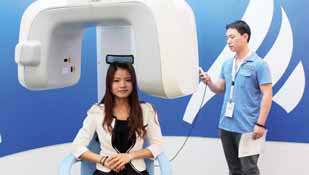China gets teeth into dental scanners
|
At the China Dental Exhibition and Scientific Conference in Beijing, dental computerized tomography scanners attract a host of orders. Provided to China Daily |
As more Chinese people pay attention to dental health, manufacturers of high-tech dental scanners are gearing up to meet a surge in demand from hospitals and clinics.
At the China Dental Exhibition and Scientific Conference in Beijing, which ran from Saturday to Tuesday, dental computerized tomography (CT) scanners that give 3-D images of the mouth and jaw, attracted large crowds and a host of orders.
Su Genchang, a sales agent for KaVo Dental GmbH, a German company with more than 100 years in the industry, said the dental scanner market in China has grown suddenly in the past year or two.
"Back in 2010, there was barely a customer coming to me for dental CT, but last year, we sold more than 100 units in China," Su said, adding that most orders came from medical schools and hospitals that specialize in treating diseases of the mouth.
KaVo's products are priced between 1.75 million yuan ($274,000) and 2.3 million yuan, among the most expensive of its kind.
"In Germany, almost every dental clinic has bought dental CTs for checkups, but there are less than 200 units in all of China," Su said.
He predicted the next 10 years will be a "golden age" for dental scanners in China.
"Every year, about 20 million dental implants are done in China, and every case requires a CT scan before treatment according to Western medical standards," he said. "So there is great potential for this machine."
Wang Yonggang, general manager of LargeV Instrument Corp Ltd, the medical subsidiary of Nuctech Co Ltd, China's largest security inspection products company, estimated that at least 1,000 new dental CT scanners will be needed every year in China for the next 10 years.
"Previously, dental treatments relied heavily on a doctor's experience, but it proved to be very risky," Wang said. "For example, dental implants require accurate teeth positioning. If the doctors make wrong judgments, nerves can be hurt and the patient may suffer facial paralysis."
Noted initially for its subway security inspection system, LargeV entered the medical field five years ago. At first, Wang and his team were afraid that they might be seen off quickly by the big names in the medical equipment industry - GE, Philips and Siemens - but it turned that the market for dental scanners was a niche one that the big three companies were ignoring.
With LargeV's dental CT unit costing 1.35 million yuan, Wang said the market is big enough for his company to do well.
"The home-developed machine is compatible with the digital medical network in China, therefore saving the trouble of translation and manual adjustments, which happen on imported machines from time to time."
Industry sources said that, along with KaVo, China's dental CT market is occupied by New Tom, from Italy, and Vatech from South Korea.
Wang is considering selling its dental CT scanner to the South American market, after his company sold more than 10 security inspection machines to the Brazilian government in 2010 for service at ports. The deal totaled $50 million.
"I believe with the competitive price and established networks, I can explore both the Chinese and the developing countries' markets at the same time," he said.
Wang Gang, general manager of Vatech, said the traditional two-dimensional dental films are being replaced quickly by dental CT scans.
"Shanghai now has the highest number of such machines in China, and I think other cities will catch up soon," he said.
wangchao@chinadaily.com.cn



















